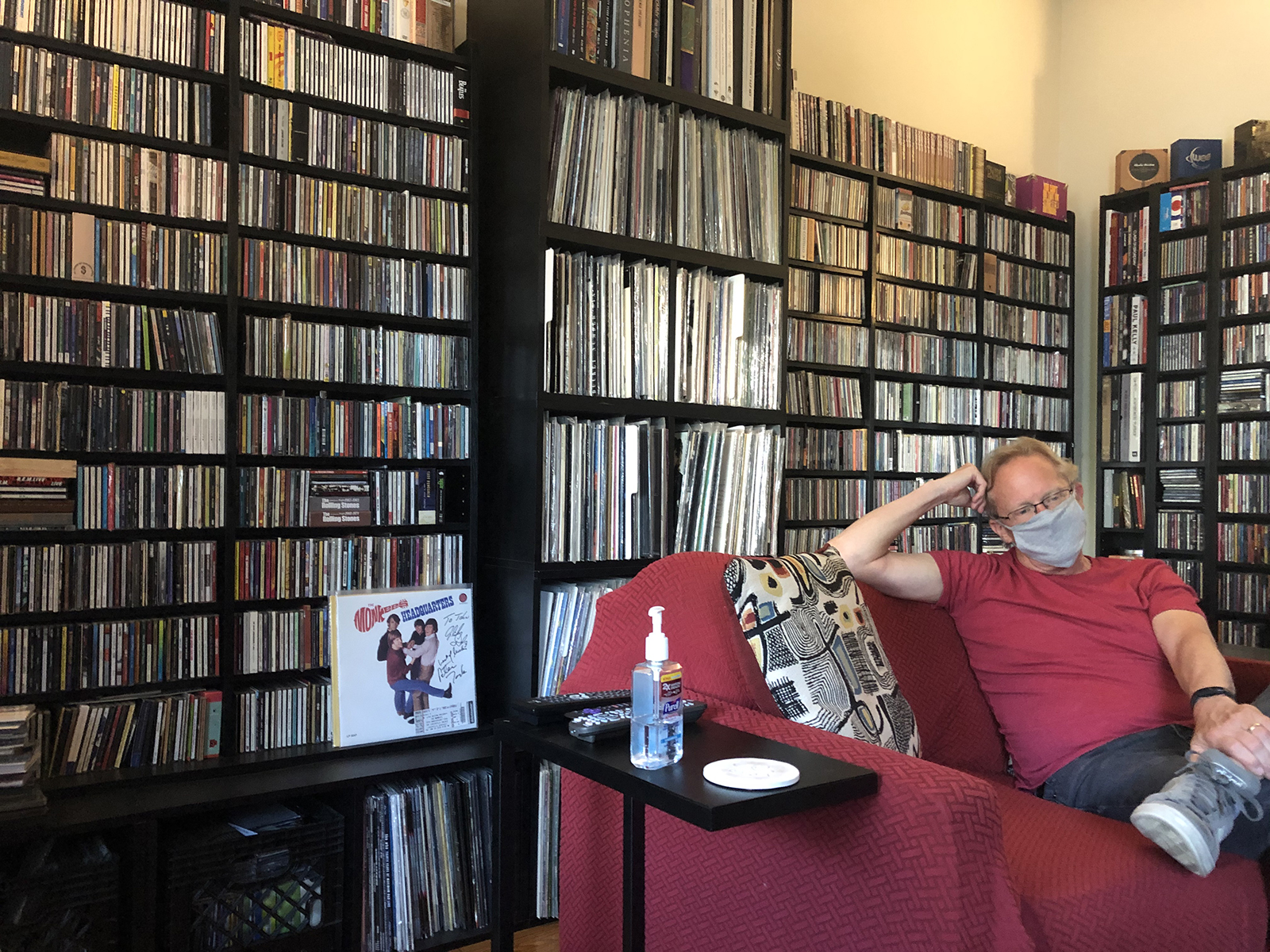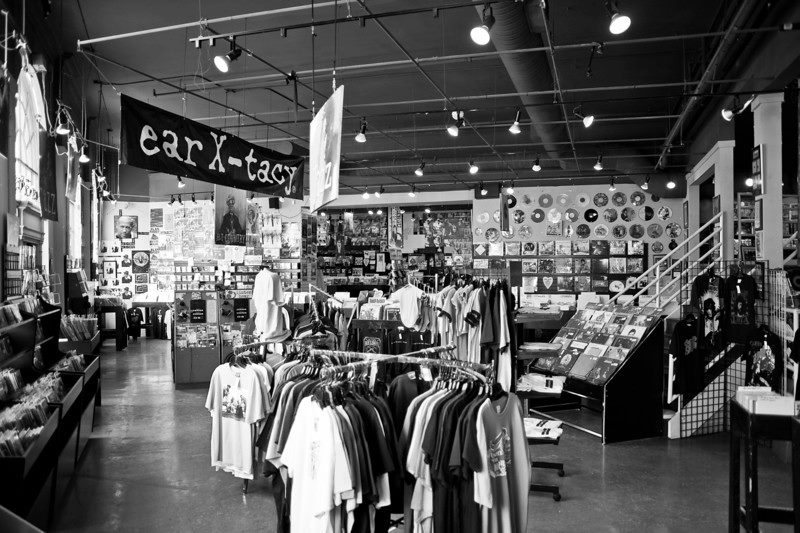In 1993, ear X-tacy moved to its most iconic location on Bardstown Road, a building that had most recently been a Pier 1 Imports. ear X-tacy was there for 16 years and is what many people remember as the only ear X-tacy.
Carney: It’s kind of a weird building. It’s got this weird parking lot at a weird angle.
According to University of Louisville regional history archivist Tom Owen, the building at 1534 Bardstown Road was constructed in the mid-1920s for the Laib Company, a local distributor of mill, mine and plumbing supplies. There was a warehouse in the rear and a display room up front. The building’s history was marked by sometimes years-long vacancies, including in the late 1930s and early 1940s. It was next the home for the JuceRich Beverage Co. and then the Cushman Motor Scooter Co., before being subdivided for offices in the 1950s. The building housed insurance offices until it became a Pier 1 in 1988.
Timmons: It was massive. That space was 10,000 square feet.
Carney: The sheer volume of records that they had at that location was just staggering.
Matt Anthony (employee from 1999 to 2011, local music consignment manager): It’s hard to even fathom it now. Like, I’ve got a picture; you see it now, your jaw drops. To see that much product in one space just doesn’t happen anymore.
Mercer: Just rows upon rows of music.
Anthony: Obscure stuff, all over the place.
Mercer: It just felt like its own world in there.
Timmons: I had more than a few artists tell me that the store had a soul.
Pell: A lot of it was that it came with these really crazy, cool red floors. It would have been cool anyway, but the fact that it had these red floors — I always thought that was just great. Red floors, black (record) bins.
Carney: I think part of it was architectural, just the design of the building.
Pell: It was almost warehouse-y — exposed pipes, very open, high ceilings.
McKnight: For someone who loves music, it was like being in Disneyland.
Kaelin: Magic. It had those high ceilings and that staircase that went up to that secret room up top.
Pell: It had an upstairs, where first it was all T-shirts and…then it became the hip-hop area. You could stand upstairs and see around the store.
Bailey: The windows up front where you could peer out to Bardstown Road while looking at the jazz section.
McKnight: Such a big piece of real estate, Bardstown Road being the main cultural artery.
Zopp: That kind of weirdly intellectual creative spirit of the Highlands. That’s where that came from.
Timmons: We were at the right place at the right time. The industry was in pretty good shape.
Carney: When I went from the stoner crowd to the punk-rock crowd, that’s when we would just start hanging out on Bardstown Road a lot because there wasn’t shit else to do — and so we would go to ear X-tacy.
Shadwick Wilde (songwriter, lead singer of Quiet Hollers): It gave the sense of being a place that was inviting the music community to come and be in that space.
Mercer: It just looked like a place you’d want to hang out.
Bailey: The people who worked there, that was their religion — music was their religion.
Mercer: It looked like people had made it their home over the years.
McKnight: Stickers all over the place.
Pell: John gave me a little bit of artistic license to make the bins look cool. I went and bought a bunch of different paints — and confetti and googly eyes — and I handmade all of the cards that went in the back of each bin, each row where it said “Pop Rock” or “Oldies” or “Indie Rock.” I made all of those by hand. I got Christmas lights, and we ended up stringing Christmas lights and then hanging big pieces of different colored posterboard, where I spray-painted “Pop Rock” or “Rap” or whatever and hung them from Christmas lights over these big exposed beams and pipes.
Carney: It definitely was not this clean-cut organized way of decorating that you would associate with the record stores I was familiar with — these corporate, chain-y kinds of places that you would go to in the mall. Essentially like Camelot Music.
Wilde: One of the more exciting things to me about it was the bulletin board where all the local shows would be listed.
McKnight: It was the honeycomb.
Anthony: It was a hub like that. Like bands formed there, you know — multiple, multiple bands.
McKnight: I can’t tell you how many times I posted on that damn board. All the time. “Need drummer.”
Kaelin: “Looking for a bass player” ads. So many people found each other through ear X-tacy.
Anthony: There were rave flyers everywhere and sometimes you’d just use them for decoration because they were so artistic. Everyone was trying to get everyone’s eye because that’s what got people to the party.
McKnight: As a producer, you always wanted the prime window space.
Anthony: Before Twitter, Instagram, Facebook — before any of that, your flyer got people to your party. They were little works of art, man.
Kaelin: Those bumper stickers were like, “I’m cool. I’ve been to ear X-tacy.”
Timmons: I hated bumper stickers.
Kaelin: You got a free bumper sticker when you bought a CD.
Timmons: I had a sales guy that kept coming into the store wanting to sell personalized stuff like pens with your name on ’em or calendars with your name on ’em. He kept coming in, would not take no for an answer. I said, “What’s the cheapest thing you got?” and he goes, “We got these bumper stickers.” So we did a small run of bumper stickers just to get him off my back.
Bucayu: Accidental marketing — accidental successful marketing.
Kaelin: I remember going to New Zealand when I was in 11th grade maybe, and we saw ear X-tacy bumper stickers there.
Bucayu: I don’t know who started it, but I guess somebody had cut up a sticker — I don’t know if it was “ax yer cat” or something — and put it on their bumper, and all of sudden everybody started doing it.
Kaelin: People would go in there and collect them, and at school everyone would be making their [drops voice] “show posters.” I went to Atherton at the height of the indie-rock stuff; everybody would be like [drops voice] I’ve got a show this weekend. I do that dumb voice ’cause I’m bitter at the boys who wouldn’t let me into their Cool Club.
Mercer: There were genres that at the time I didn’t even really know existed.
Clark: Man, (employee) Michael Steiger used to get the longest rockabilly CDs and play them. These like 80-minute CDs [laughs].
Bailey: When I walked in to ask if they were hiring and to get an application, they happened to be playing one of my brother’s bands at the time — Second Story Man.
Clark: The first day I ever worked at ear X-tacy, (then-manager) Billy Sims — I’ll never forget this. He was playing this group called Panasonic — experimental electronic music. And it’s like a bass trip, like DU-DU-DU-DU-DU. It’s crazy insane. I could even hear the music through the front door. I ended up buying that.
Bailey: I just remember going in there (for an interview), not feeling super confident, and just wondering if it was going to turn into like a Q&A session of what section Billie Holiday belongs in and what section Kinghorse belongs in — and there were those questions. It was like a pop quiz.
There was a learning curve big time with working at ear X-tacy, because not only were there artists that had been around for decades that people are coming in asking for on a daily basis, but you also have to be hip to the latest releases and the trends and what people are listening to.
Kaelin: I was always a little nervous and felt a little uncool going to the checkout and getting my jazz CDs. It was always like, “Oh, god, who’s going to be at the counter. I hope it’s a girl.”
Mercer: There weren’t, quite frankly, a lot of women. I think there were maybe four or five total the entire time I worked there.
Kaelin: The first girl I remember working there was Rebecca Mercer.
Mercer: It wasn’t that we didn’t hire women or that we didn’t try, but people just didn’t apply. Most of the people, at least in my time frame, were in bands that didn’t have female leads or didn’t have women in them. And so you’d hire so-and-so’s friend because they were in the band together. I don’t know, we just never had a lot of females apply. Usually when we did, as long as they interviewed well and knew music and could handle our crazy hours, we’d hire ’em. But we didn’t get too many.
Bailey: It was just a melting pot of all these different fans of various genres. So if you didn’t know the answer to a question, you could go check with our indie-rock guy or you could check with our jazz guy or you could check with our hip-hop guy.
Jaxon Swain (musician, including lead singer of the band Jaxon Swain; ear X-tacy employee from 2008 to 2011): Closing the store down was always a blast.
Clark: Saturday night it could get kind of wild.
Swain: We’d be turning on whatever music we wanted, no matter how weird or challenging it would have been for everybody.
Clark: Christmastime was always my favorite because it was so busy and you’re helping people.
Swain: When Michael Jackson died, everybody in the city who had a copy of Thriller on vinyl came in with it, thinking they were going to get a million dollars for it — when really, it’s one of the best-selling records of all time, so really, it’s worth nothing.
Pell: One time, one of the employees stuck his head in the back room and said, “Hey, does anyone know anything about the band Smog? There’s some guy in here who wants to talk about Smog.” I’m like, “Yeah, I love Smog.” It’s this British guy, and I said, “Here’s the Smog album.” And then we started talking and I got him to buy Slint and I got him to buy Built to Spill — he was one of those great customers. I loved when people bought what I was recommending. He ended up buying a big stack of records. Somebody told me it was Gavin (Rossdale) from Bush.
Mercer: (John) spoiled any artist that came in town. If they had a stack of stuff they wanted to buy, he just gave it to them. That was kind of always his thing.
Bailey: I remember Ryan Adams coming in and thinking to myself, Is that really Ryan Adams? Or is that just some dude with dirty hair and a jean jacket that looks like Ryan Adams? And no, I mean, it was him.
Anthony: White Stripes coming to shop there. I mean, Jack and Meg in their red and white outfits coming in digging for records.
Clark: (Rock journalist) David Fricke — that was pretty awesome. He wrote for Rolling Stone. To me that’s a huge deal.
Anthony: No one anticipated the draw for Tenacious D.
Timmons: Two fat guys sitting at a table signing autographs and being smartasses.
Anthony: Jack Black was not Kung Fu Panda, you know? But they had a crazy cult following even back then, and the line went around the parking lot. And people were going CRAZY to get in the store to see Tenacious D.
Timmons: Jack Black was the character in High Fidelity. People were coming, bringing up stuff to the table to have them sign. And this girl brought up a burned CD. He goes, “I’m not going to sign a fucking burned CD!” and he throws it across the store. I felt sorry for the girl, but it was classic. He should’ve worked at the store.
Clark: The singer for the Black Crowes is really tall.
Anthony: Black Keys on their first record.
Bailey: That was a special moment.
Anthony: I’ve got the very first Black Keys CD signed by the Black Keys at ear X-tacy. It was like half full.
Bailey: A schoolteacher that was a great customer at ear X-tacy actually brought his class to see the Black Keys. I mean, if I remember correctly, they came in and set up their own equipment and spent a lot of time out in the parking lot smoking cigarettes.
Anthony: Rob Zombie, super cool. Definitely a nerd.
Bailey: We had such a robust schedule with our in-store performances.
Anthony: Nightly there would be some performance, at least an acoustic guitar.
Anthony: This is the way to really get to know, interact with the artist. They were very low-key. They might not play any hits. They’re going to do it acoustic. You’re going to get something totally different from the show later that night. This isn’t a rock show with big lights and smoke machines and footage behind you. That’s what you get later on that night. When you came to see a band at ear X-tacy, you were also with people who were way into the band.
Mercer: We had Del McCoury, a bluegrass musician with a gigantic bus that they would bring and try to park across the street. And I remember just standing in the middle of Bardstown Road trying to direct traffic to get this bus somewhere where it wouldn’t get hit.
Anthony: I remember people getting pictures of John Mayer.
Timmons: He was selling records out of his car in indie stores before he got signed to Columbia.
Mercer: The thing I remember most, because he signed our wall in the bathroom, is that he fixed our toilet because it was broken.
Clark: The one that stands out is the Foo Fighters.
Mercer: I think that was potentially, with the exception of My Morning Jacket, the biggest.
Clark: The night before, somehow, I got in charge of moving a ton of the CD bins. Oh, I was so tired. We had to move all the CD bins either upstairs or in the back. They came in, they built a stage. It was insane.
Carney: I didn’t get in the building because it was like mayhem trying to get a foot in the door. There were just so many people lined around the block to get in there.
Timmons: Dave Grohl signed off that he cleaned the bathroom, but he did not clean the bathroom.
Clark: This kid just comes up out of the audience, man, and starts like grabbin’ the microphone and just starts rapping, and the drummer starts kicking in. It was insane.
Timmons: I wish we’d had the foresight to document every in-store performance — a few thousand.
Pell: That was just a beautiful record store. I remember every time I walked into that space, even all the years I worked there, just being like, “Mannnnn, this is such a cool job.”
Anthony: It was Empire Records for real, man.


